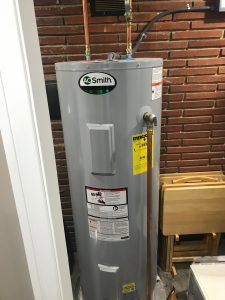Each person may have their own unique thinking in relation to Common Problems with Your Home Water Heater.

Visualize starting your day without your regular warm shower. That already sets a poor tone for the remainder of your day.
Every home requires a trustworthy hot water heater, but just a few understand exactly how to manage one. One very easy method to maintain your hot water heater in leading shape is to check for faults consistently and also repair them as quickly as they show up.
Bear in mind to shut off your hot water heater before sniffing around for faults. These are the water heater faults you are probably to run into.
Water also warm or also chilly
Every water heater has a thermostat that identifies exactly how warm the water gets. If the water entering into your house is too warm despite setting a convenient maximum temperature level, your thermostat may be faulty.
On the other hand, too cold water may be because of a failed thermostat, a busted circuit, or incorrect gas circulation. For example, if you use a gas water heater with a broken pilot burner, you would get cold water, even if the thermostat remains in best condition. For electric heaters, a blown fuse may be the culprit.
Lukewarm water
Despite exactly how high you set the thermostat, you won't obtain any type of hot water out of a heating unit well past its prime. A water heater's efficiency may reduce with time.
You will additionally obtain warm water if your pipelines have a cross link. This indicates that when you switch on a faucet, warm water from the heating system flows in together with routine, cold water. A cross connection is simple to area. If your hot water taps still run after shutting the hot water heater valves, you have a cross link.
Weird noises
There go to the very least five type of noises you can speak with a hot water heater, but one of the most common analysis is that it's time for the water heater to retire.
Firstly, you need to know with the regular sounds a water heater makes. An electrical heating system may seem different from a gas-powered one.
Popping or banging audios normally imply there is a slab of sediment in your storage tanks, and it's time to clean it out. On the other hand, whistling or hissing sounds may just be your valves allowing some pressure off.
Water leaks
Leakages could originate from pipes, water links, valves, or in the worst-case scenario, the container itself. Over time, water will certainly corrode the container, as well as locate its way out. If this takes place, you need to replace your water heater asap.
Nevertheless, before your adjustment your entire container, make sure that all pipes are in place which each shutoff functions flawlessly. If you still require assistance recognizing a leak, call your plumber.
Rust-colored water
Rust-colored water indicates among your water heater parts is worn away. It could be the anode pole, or the tank itself. Your plumber will have the ability to determine which it is.
Insufficient warm water
Hot water heater been available in numerous dimensions, relying on your hot water demands. If you run out of warm water before every person has actually had a bathroom, your hot water heater is as well small for your family size. You need to consider setting up a larger water heater container or opting for a tankless hot water heater, which takes up much less area and also is much more long lasting.
Discoloured Water
Rust is a major root cause of unclean or discoloured water. Corrosion within the water tank or a stopping working anode rod might cause this discolouration. The anode pole shields the tank from rusting on the inside and should be checked annual. Without a pole or a correctly working anode pole, the warm water swiftly rusts inside the tank. Get in touch with an expert water heater specialist to determine if replacing the anode pole will fix the issue; otherwise, change your hot water heater.
Conclusion
Ideally, your water heater can last 10 years prior to you need a modification. Nevertheless, after the 10-year mark, you might experience any of these mistakes more consistently. At this moment, you must add a new water heater to your spending plan.
How To Troubleshoot 3 Common Water Heater Problems in Twin Cities
The Water Heater Is Leaking
A leaky cold water inlet valve A loose pipe fitting A leaky temperature and pressure relief valve A corroded anode rod A cracked tank Turn Off Your Water Heater:
Shut off your gas water heater by turning the gas valve on the unit to the “OFF” position. Shut off your electric water by switching its power off at your electrical panel. Look for a two-pole breaker labeled “water heater” and turn it to the “OFF” position. Move the ball valve connected to the water heater to be perpendicular to the piping at a 90° angle. Look for the Leak:
Depending on whether the water is coming from the tank's top or bottom, you’ll want to look for the leak in different locations.
If the leak comes from the top of the tank, carefully look for water escaping from the cold water inlet valve or loose pipe fittings. Rusted hot and cold water valves can have loose connections with the tank, with water leaking out of them.
https://mspplumbingheatingair.com/blog/how-to-troubleshoot-3-common-water-heater-problems
As an avid reader on Water Heater Repair and Troubleshooting, I was thinking sharing that excerpt was essential. If you appreciated our page if you please don't forget to pass it around. Thank you so much for taking the time to read it.
Search no more; expert plumbers.